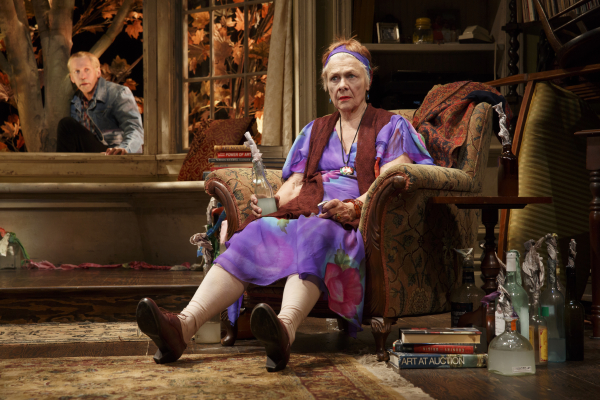The Velocity of Autumn
Estelle Parsons and Stephen Spinella costar in Eric Coble’s comedic two-hander about love, family, and life’s passing seasons.

(© Joan Marcus)
Arthritic joints, crumbling cartilage, varicose veins: The autumn of life is a far uglier sight than the colorful passage to dormancy that nature endures each year. The great Estelle Parsons — Oscar-winning legend of stage and screen — is the embittered spokesperson for this bleak message. She stars as 79-year-old Alexandra in Eric Coble's dark comedy The Velocity of Autumn, Broadway's newest transfer from Washington, D.C.'s Arena Stage. As her life's final seasons grind to an excruciatingly slow halt, throwing herself a Viking funeral seems the only way to inject some nobility into the gruesome process.
We catch Alexandra dreaming of booming pyrotechnics in her Park Slope brownstone as she sleeps the restful slumber of a near-octogenarian ready to end her slow decay with a roomful of explosive chemicals and an old Zippo. Her once-well-kept living room (designed by Eugene Lee) now reflects a mixture of neglect and hysteria. Its chipped pea-green walls surround a long train of glass bottles, each holding a few inches of film-developing fluid ("It's more combustible than gasoline," she later brags), while the front door is sealed shut with duct tape and a homemade barricade, courtesy of Crate & Barrel. Still, Alexandra has put on her Sunday best for the auspicious occasion, wearing a flowing floral dress and matching headband (designed by Linda Cho), well suited for the eccentric character we're about to meet.
As you chuckle at the mixture of absurdity and desperation at the first sight of these surroundings, in through the tree-guarded bay window climbs Chris (played by two-time Tony winner Stephen Spinella), Alexandra's long-absent 40-something son. He is sent on behalf of his two siblings to make one final plea for her to peacefully give up her home and move to an old-age facility (or insane asylum, as the case may be). Still, she insists that it's boom or bust, and if she's going down, she's taking the ship (and the rest of the block) with her in a blaze of glory.
Director Molly Smith has recruited two of New York's finest actors for the 90-minute sparring match that ensues. The absurdity of the play's premise quickly fades into the background, leaving only Parsons and Spinella with their mother-son chemistry to keep us engaged — and save a few sporadic lulls, they succeed. Alexandra's bomb threats are unconvincing from the start, making the entire foundation feel more like a playwright's creative excuse for the pair's meeting than a genuine engine driving the events forward. Still, no matter their reason for coming together at this moment in time, Alexandra and Chris share several nice moments in the explosive apartment — both comic and poignant — that are pleasing enough to make you a satisfied fly on the wall.
Spinella, with his earthy denim jacket, cowboy boots, and graying ponytail, sinks back into childhood as he faces his domineering mother for the first time in what may be decades, considering Alexandra's surprise at his aged and grungy appearance. The pair rehashes their history, offering a few humorous anecdotes about Chris' childhood and the unorthodox mother who shaped it, while explaining the common love of art that has connected them since their earliest field trips to the Guggenheim. Sadly, Alexandra's debilitating arthritis has ended her own painting career. This leaves Chris, upon his unanticipated homecoming, to pick up the torch his mother has been forced to surrender, both as an artist and as the unrivaled leader of the family, a title she has tightly clutched ever since her husband's passing.
Parsons, who in real life is seven years older than the woman she portrays onstage, seems to share in none of Alexandra's suffering. Her comedic timing is sharp as ever, and as she takes her curtain call she still seems spry enough to tackle the mountainous staircase she conquered each night six years ago in August: Osage County. Though in her character's diminishing body, Parsons becomes the ideal megaphone for the woes of old age. Coble allows her to let loose on what turns into a one-woman comedy act, bemoaning every ache and pain that has befallen her to a sea of empathetic guffaws — a moment of ecstasy reserved for only those mature audience members who have had the honor of sharing in such glorious experiences. Children of aging parents will find a similarly satisfying voice in Chris as he makes his visible transformation from docile child to parental caretaker over the course of one emotionally heightened afternoon.
The play offers no groundbreaking revelations about the nature of these complex familial dynamics and obligations — nor about our captivity on this endlessly revolving carousel of time (to borrow from Joni Mitchell). It does, however, shine a relatively and perhaps unrealistically optimistic light on a situation incapable of having a truly happy ending. Yet, like Alexandra's beloved tree that looms over her brownstone, lush with auburn leaves that flood her bay window, we find her own branches can withstand a few more gusts of wind before they go completely bare. I suppose that's all anyone can ever ask for.








